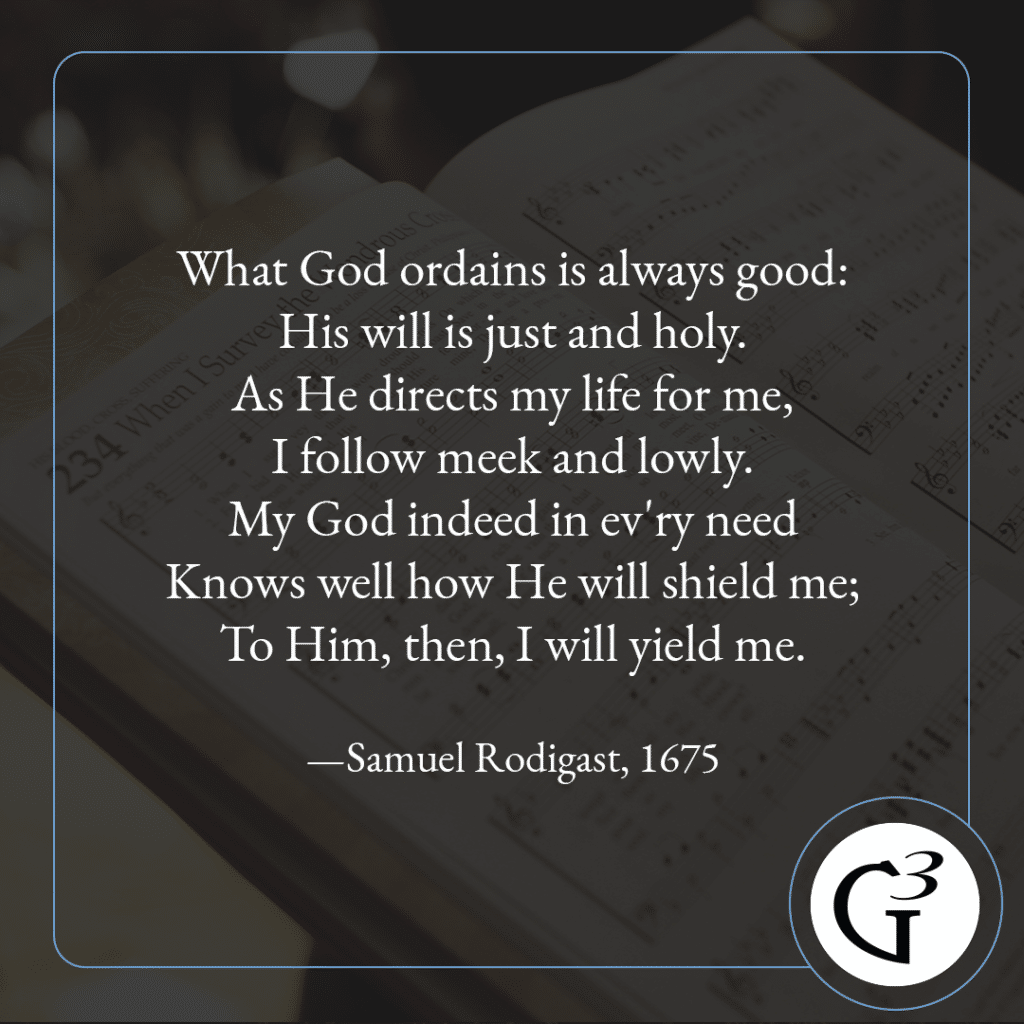
Samuel Rodigast was a one-hit wonder of the hymnological world.
But perhaps this is not a fair way of looking at the seventeenth-century German pastor and university professor who left behind only a couple of hymns at his death. Despite Rodigast’s few hymns, John Julian’s standard Dictionary of Hymnology calls Rodigast’s text “What God Ordains Is Always Good” “one of the first rank” (Julian, 972).
In 1675, Rodigast had completed his university training and was living in the German city of Jena when his friend Severus Gastorius (1646-1682), the church cantor, became severely ill. To encourage his sick friend, Rodigast wrote a hymn text of six stanzas, each of which began, “Was Gott tut, das ist wohlgetan” (What God does is well-done). According to some accounts, Gastorius wrote a tune for the words, expecting it to be sung at his funeral. However, Gastorius recovered, finding continued comfort in the words that his friend had written for him.
The traditional tune (WAS GOTT TUT) bears strong similarities to a 1659 tune by composer Werner Fabricius (“Frisch auf, mein Geist, sei wohlgemuth”), and was used by the end of the 1680s with other hymn texts in a hymnal for which Gastorius contributed some tunes. If the sickbed story is true, perhaps Gastorius was thinking of Fabricius’s tune, found that the opening lines of the melody fit Rodigast’s text, and expanded upon the tune to fill out the text.
Rodigast’s hymn quickly became popular, being employed by noted composer Johann Pachelbel in an organ piece in the early 1680s. In the following century, Johann Sebastian Bach incorporated all or part of the hymn into no fewer than six of his church cantatas, and also used the tune in several other settings as well. Here, for example, are outstanding performances of Bach’s arrangements in Cantata 75 performed by cellist Yo-Yo Ma and in Cantata 99 by guitarist Christopher Parkening.
Among the many translators of this text over the centuries, Catherine Winkworth’s 1863 version contains all of the power and grace that typically characterizes her work. The Lutheran Hymnal 1941 provides another beautiful translation, which composer Dan Forrest used for his 2013 setting of the Gastorius’s tune. Composer Josh Bauder also used this text for the new tune he wrote for “What God Ordains” in the same year (see text below).
Many phrases of the text deserve comment and expansion. Particularly striking, however, is the end of the second stanza. Rodigast (through his translator) writes, “Some day I shall see clearly” . . . what? Why all those bad things happened? Why that loved one died of cancer, why that job was lost, why that cute girl (or guy) in 7th grade never gave me the time of day? No. Rather, the hymn states, “Some day I shall see clearly/That He hath loved me dearly.” Even if all those questions never get answered here on earth or even in eternity, God’s children can trust that He loves us dearly. In heaven, we may learn nothing more than this, and that will be enough.
“If you then, being evil, know how to give good gifts to your children, how much more will your Father who is in heaven give what is good to those who ask Him!” (Matt 7:11). Or, as Habakkuk learned, “Though the fig tree should not blossom, and there be no fruit on the vines, though the yield of the olive should fail and the fields produce no food, though the flock should be cut off from the fold and there be no cattle in the stalls, yet I will exult in the Lord, I will rejoice in the God of my salvation” (Hab 3:17–18).
Among hymns on the sovereignty of God, few can surpass the power, the beauty, the hope of this poem written by a young man for the encouragement of a sick friend—and of many generations after him.
What God ordains is always good:
His will is just and holy.
As He directs my life for me,
I follow meek and lowly.
My God indeed in ev’ry need
Knows well how He will shield me;
To Him, then, I will yield me.
What God ordains is always good:
He is my Friend and Father;
He suffers naught to do me harm
Though many storms may gather.
Now I may know both joy and woe;
Some day I shall see clearly
That He has loved me dearly.
What God ordains is always good:
Though I the cup am drinking
Which savors now of bitterness,
I take it without shrinking.
For after grief God gives relief,
My heart with comfort filling
And all my sorrow stilling.
What God ordains is always good:
This truth remains unshaken.
Though sorrow, need, or death be mine,
I shall not be forsaken.
I fear no harm, for with His arm
He shall embrace and shield me;
So to my God I yield me.
—Samuel Rodigast, 1675





